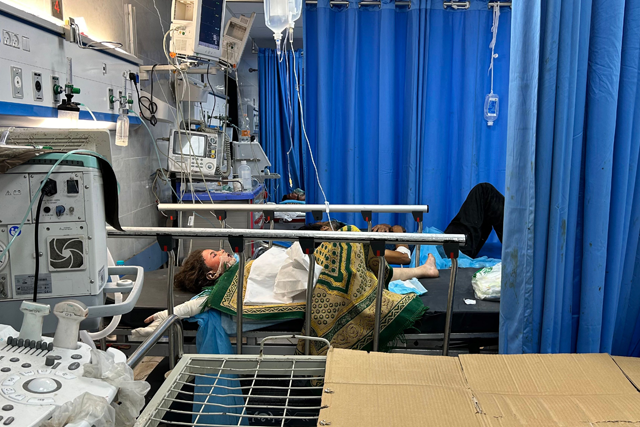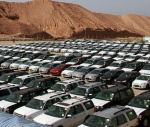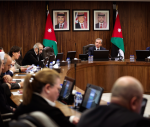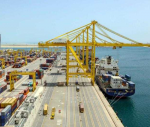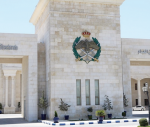You are here
‘Lack of baby formula in Gaza forces mothers to resort to fresh milk intended for older babies’
By Heba Elayyan - May 14,2024 - Last updated at May 14,2024
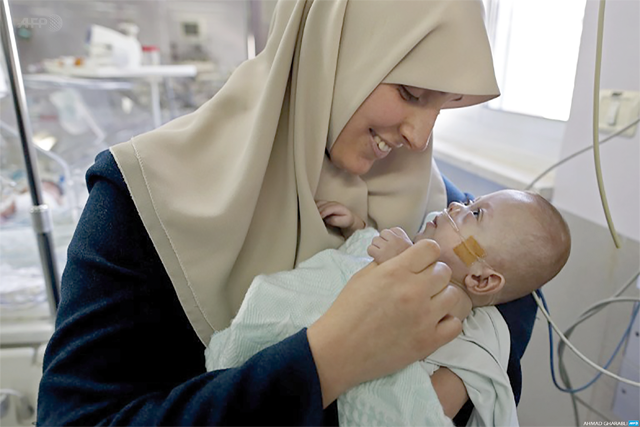
A mother from the Gaza Strip is reunited with her 7-month-old daughter at Al Maqassid hospital in East Jerusalem on February 20, 2017, for the first time since the baby’s premature birth (AFP photo)
AMMAN — In Gaza, thousands of children are dying due to hunger and lack of clean water, a Jordanian pediatrician who visited the Palestinian enclave in the recent months told The Jordan Times.
Ammar Alhmoud, who has been one of the first Jordanians to volunteer in Gaza with the International Medical Corps, discussed the challenging conditions affecting the children in the war-ravaged strip.
According to Gaza’s health ministry, the Israeli offensive has displaced nearly 2.3 million people across Gaza, caused a starvation crisis, and killed more than 35,000 Palestinians.
At least 360,000 Palestinians have fled Rafah, according to the UN, as Israeli officials promise to continue their military operation in the city.
Alhmoud highlighted the severe impact of the Israeli aggression on children, emphasising the critical need for essential supplies such as vaccines, formula milk, and food.
Alhmoud underscored the alarming decline in vaccine availability in Gaza, with existing supplies primarily located in UNRWA centres that are increasingly difficult to access, which exacerbates the dangerous health situation for children in the strip.
He also highlighted the lack of appropriate nutrition for infants due to the scarcity of formula, inadequate breastfeeding, and the nutritional deficiencies caused by food shortages and maternal health issues, forcing mothers to resort to fresh milk intended for older babies.
He added that thousands of mothers endure a lack of privacy while residing in overcrowded tents or makeshift schools, facing challenges in finding suitable spaces for breastfeeding, which significantly hinders their ability to nourish their infants properly.
The paediatrician stressed the rise of preventable diseases among children, exacerbated by limited access to clean water, essential vaccines, among other factors.
He recalled the heart-breaking deaths of two teenagers due to liver disease, a condition, the doctor added, that could have been prevented with appropriate vaccination and better access to clean water.
The UN aid office emphasised the critical and immediate need to repair the Deir Balah water pipeline, which has a daily capacity of almost 17,000 cubic metres, crucial for supplying clean water to the population.
“This repair is essential, especially with the increasing disease rates linked to poor sanitation and malnutrition,” the office said on its website.
Alhmoud also highlighted the shortage of medical equipment like incubators, crucial for new-born care, which are now restricted to certain hospitals in Gaza, posing challenges to meet the increasing demands for specialised neonatal care.
“The inadequate availability of essential services has led to devastating losses for numerous mothers who have tragically lost their children due to the absence of adequate medical assistance and support,” he said.
Another major challenge affecting Gazans, according to Alhmoud, is the high costs of essential food items like vegetables, fruits, eggs, and milk. “A carton of eggs is priced at JD40.”
With the increased demand for food supplies and medical aid following the Israeli incursion into Rafah, the Foreign Ministry reported multiple Israeli attacks on Jordanian aid trucks destined for Gaza. These attacks have obstructed the delivery of essential aid to the Palestinian territory, exacerbating the humanitarian crisis.
Related Articles
RAFAH, Occupied Palestine — With eyes wide open and his tiny fists clenched tightly, Mohammed Kullab is just a few days old, having started
Breastfeeding is credited with a long list of benefits, but one downside of extended and intensive breastfeeding may be a higher risk of cavities in baby's first teeth, according to a new study.
AMMAN — The exclusive breastfeeding rate in Jordan is well below the regional average, according to a statement by the Higher Population Cou


